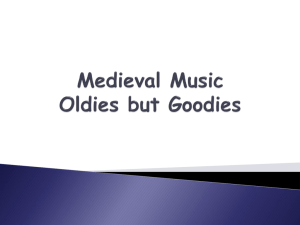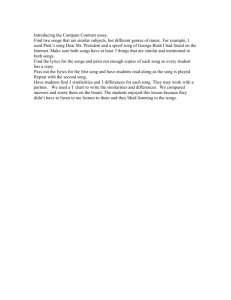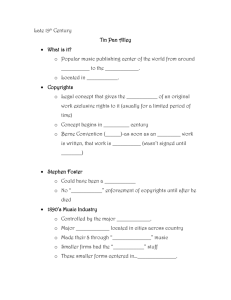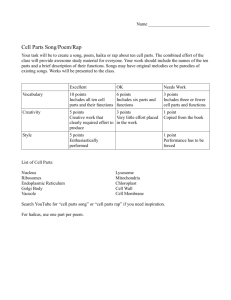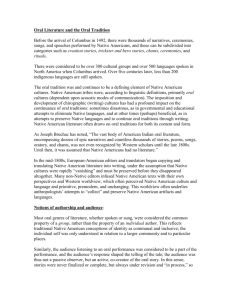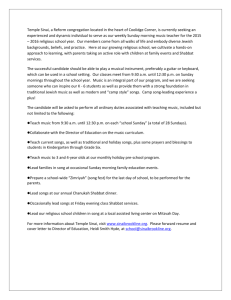Fanchants - The Missouri Folklore Society
advertisement
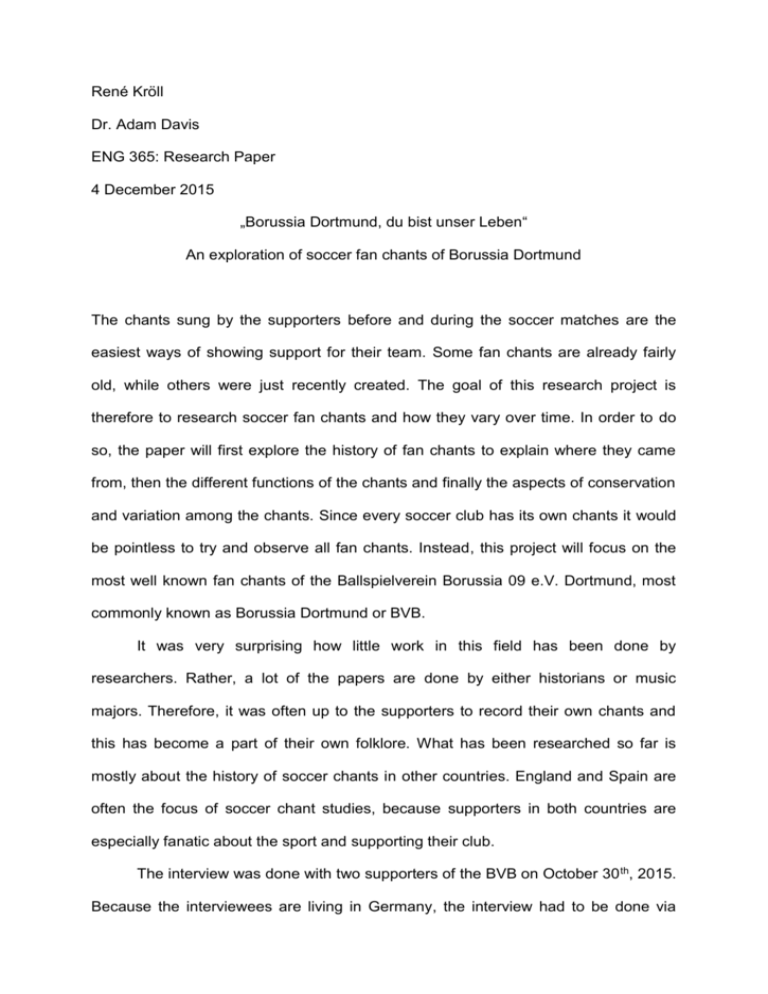
René Kröll Dr. Adam Davis ENG 365: Research Paper 4 December 2015 „Borussia Dortmund, du bist unser Leben“ An exploration of soccer fan chants of Borussia Dortmund The chants sung by the supporters before and during the soccer matches are the easiest ways of showing support for their team. Some fan chants are already fairly old, while others were just recently created. The goal of this research project is therefore to research soccer fan chants and how they vary over time. In order to do so, the paper will first explore the history of fan chants to explain where they came from, then the different functions of the chants and finally the aspects of conservation and variation among the chants. Since every soccer club has its own chants it would be pointless to try and observe all fan chants. Instead, this project will focus on the most well known fan chants of the Ballspielverein Borussia 09 e.V. Dortmund, most commonly known as Borussia Dortmund or BVB. It was very surprising how little work in this field has been done by researchers. Rather, a lot of the papers are done by either historians or music majors. Therefore, it was often up to the supporters to record their own chants and this has become a part of their own folklore. What has been researched so far is mostly about the history of soccer chants in other countries. England and Spain are often the focus of soccer chant studies, because supporters in both countries are especially fanatic about the sport and supporting their club. The interview was done with two supporters of the BVB on October 30 th, 2015. Because the interviewees are living in Germany, the interview had to be done via René Kröll Skype with some emails to clear up questions afterward. While both are members of Borussia Dortmund, neither of them is part of the ultra-scene. Both of them go to home and away matches as often as possible. One has a season pass for the Südtribüne, the stands of the most diehard Dortmund supporters; the other has been trying to get one for year already. The informants are both male, between 27 and 30 years old and have a broad knowledge about the club, its history and the fan scene surrounding the club. Conservation: “You’ll never walk alone” England, often credited as the homeland of soccer, is also the place where journalists and fans remember the first soccer chants. While there is no consensus on when the first soccer chants appeared, the history of one of the oldest songs connected to soccer is well-recorded: “You’ll never walk alone”. With this song we can see a great deal of conservation. During the 1960’s, it was a tradition in the Liverpool stadium to play the Top 10 hits of that week before every match. Therefore, the music would change over time depending on popularity. In late 1963, a cover version of a musical song was released by a band called Garry and the Pacemakers, which became widely popular and entered the Top 10. This subsequently led to the song being played before the match, with Liverpool supporters singing along because they liked the song. As more and more people sang along every week, the song became massively popular with Liverpool supporters. When the song finally did fall out of the Top 10 and was no longer officially played by the stadium DJ, the supporters took it into their own hands. On their own they started to sing the song, both before and during the matches. What is notable here is the change in the soccer 2 René Kröll chants before and after the adoption of the song by the Liverpool supporters. Before, soccer chants were usually only very short yells--barely more than a couple of words long (e.g. Play up Pompey, Pompey play up). It would be hard to actually consider the noises and brief yells as music, since they barely had a melody. With the popularity of “You’ll never walk alone” the fans had a way to identify with the club through a shared song, not unlike an anthem. It would be played before every single match making it part of a certain rite before the match would begin in the home stadium. The song is still played in the Liverpool stadium before every match and is nowadays seen as an inseparable part of the pre-match process. “You’ll never walk alone” has actually far surpassed the status of being just an anthem for the supporters of FC Liverpool. The song has been adapted by many clubs from all over the world to be played before their matches. This includes clubs from the Netherlands, Spain, Japan, Belgium and Germany. One of the clubs that also plays the song before every home match is Borussia Dortmund. When the song was first used is not traceable anymore, but with thousands of people singing along before the match it is easy to say that the song is well-accepted. In contrast to Liverpool though, the song is never sung during a match. Soccer chants for English teams are usually based on melodies from other songs--with new lyrics. These songs are either sung to rally one team or to discourage and insult the other. Because many clubs have ongoing rivalries, supporters not only sing chants to insult the team they are currently playing against, but also against long standing rivals. Examples for such long-lasting rivalries can be found in many countries (e.g.: Spain: Barcelona vs. Real Madrid, Real Madrid vs. Athletico Madrid; England: Manchester United vs. Manchester City, Cardiff City vs. Swansea City; Germany: Dortmund vs. FC Schalke, 1. Fc Köln vs. Borussia 3 René Kröll Mönchengladbach) and the supporters of each club usually have chants against their archrival club. The Ultra-movement For Dortmund, the informant said that the rise of the ultra fan groups heavily influenced the creation of soccer chants. In the 1990’s, most Dortmund soccer chants were just very short staccatos, without a longer melody and with only very few lyrics to it. The songs were very similar to the soccer chants in England before the 1960’s. From the late 1980’s to the early 2000’s, the ultra fan groups became more and more popular in German soccer. The ultras originated from Italy, with the first evidence ranging back into the early 1980’s. The 1990 World Cup in Italy with big choreographies probably led to ultra groups being wide-spread in German league soccer. Ultras define themselves as fanatic supporters of their team, who are in highly organized groups. It is important to note though, that ultras are not the same as hooligans. Ultras do not define their support through violence, although some members of ultra groups are also hooligans. In contrast to normal fans, ultras are far more organized, since they also meet outside of the stadium to talk about choreographies and chants. In Dortmund, more and more ultra groups were founded and they quickly grew in numbers. It is only possible through their extreme dedication to the team, to unite previously unorganized fans together, so that the entire stand or stadium is singing one song. The ultras were the ones who also brought the longer and more elaborate chants into fan culture. Their chants were heavily influenced by the ultras’ love for the own team. They either create their own melodies and lyrics to express the love for their club or they use pre-existing melodies from popular songs 4 René Kröll with a new text. These chants contrast with the pop songs played and sung in the English stadiums. The pop songs were usually not about soccer in particular and were almost never about a certain team. The songs of the ultras however, always had a strong connection to their team or to the rival team. Rooted in soccer culture, all of the songs were also about soccer or the ideas of team play and victory over the opponent. Most of the songs which are nowadays sung during home and away matches are also from the ultras. Only in very few instances are songs taken from elsewhere in the stands and then sung by the ultras. Ultimately, the ultras were the only ones who had enough influence on the fans to make them sing a certain song at a specific time. In Dortmund this is done through two ultra members. Both of them face the stands; one of them holds a microphone which is connected to speakers in front of the stands and the other one holds a megaphone. The equipment makes it easy for them to broadcast their song to the entire broadside of the stands. Both of them start singing a song at the same time and, therefore, give the rest of the fans the incentive to join in, as well as the right rhythm and tact. What is important to note here is that not just everyone can start a chant. Only the two chant leaders are broadcasted widely enough to be heard by everyone and only they can choose which song to sing next. These singers are always diehard supporters of the club and have to be a respected member of the ultra-scene. To even be considered a viable option for the next chant leader, they must be a member for at least a couple of years. While I was unable to find out how the next chant leader is chosen, the current chant leaders are reported to have been in this position for multiple years already. Therefore, it is fairly safe to say that they establish themselves for a long time until new chant leaders are found. However, the ultras do not have any control over the regular fans. This means that all chants must be accepted by the fans as well. Chants which are not popular 5 René Kröll with the regular fans are usually quickly forgotten. After all, the chants are there to be sung by a wide array of people. Only with the support of the regular fans can fan chants become popular enough to become a part of the tradition. During the interview one of the interviewee mentioned that the ultras first test a song with the second squad of Borussia Dortmund. If the song is well-received, it has a chance to be used during the next home match. The Chants The chants which are sung during the match, are very different from the pop songs played before the match. The chants are, as stated before, always closely connected to the team. Be it the current situation in the season, the match itself or special people connected to the club—all of these songs are tied to the club through the lyrics. According to Kleczkowski, these chants can be classified by their function into the following categories: songs which fans use to boost their own team, songs which the fans use to identify with the club and songs which serve to bash a rival. An example for the first category would be Auf gehts Dortmund. Here the fans try to encourage the players to win the match for them and therefore try to boost their own team to victory. The second functional category often falls together with the first category. In the second category fall songs which are meant for the fans to identify with the club. This includes the very popular Unser ganzes Leben or the just as popular Und wenn du… These songs give the fans the possibility to identify with their club and express their love for and loyalty to the club. Especially in the second example of this category, we can see that the supporters do not only want their team to win, but they will also stay loyal to Dortmund--even when the times are dark and 6 René Kröll they are at the bottom of the league table. The third and last category, songs to express hatred for a rival, is not often used by Dortmund supporters. The only team which the Dortmund supporters have specific songs about is the neighboring city’s FC Schalke 04, but here the hate for the rival club runs ever so deep. Out of the many songs against the club from Gelsenkirchen, the one that shows the hatred best would be Am Tag, als der FC Scheiße starb. In this song the singers not only threaten to physically injure fans of the opposing team, but also wish death upon the entire team; while the Dortmund supporters cheer about their funeral. Most of the other songs against other teams are rather generic and are also often used by other teams, when they play against the same opponents. A very good example for variation which came up during the interview was a song sung to the melody of a song by the artist Nena. Her love song Leuchtturm was written in a way that Dortmund supporters could also express their loyalty to the club. The song became widely popular in the 2010/11 season and was a favorite with fans. After Dortmund won the league title that year, Nena was invited to sing during the title celebration. During the celebration though, she apparently offended many fans by being overly nice and by trying too hard to befriend the team and the fans. The interview partner described it as her trying to “suck up”, which a lot of fans simply did not like. After the summer break, the song was simply not carried by a lot of the regular fans anymore and the song quickly faded into oblivion. In the current season, this rendition of Leuchtturm has barely been sung ever since and is not even remembered as a fan chant by a lot of younger supporters. This serves as an example of how quickly chants can come and go in the soccer scene. The song was created during the 2010/2011 season, became widely known and popular with both ultras and fans and was already forgotten by the beginning of the next season again, because the original singer fell into disfavor with the fans. Other reasons, why fan 7 René Kröll chants might be forgotten, are that famous people leave the club and the song is not relevant any more. However, there are also a lot of examples for conservation. Aside from the singing of pop songs before the match, there are also pre-match songs which are considered classics by many fans. The song Heja, BVB is one such song that has a firm place in BVB folklore. It is always played right before kickoff, when the teams are already standing on the pitch, to tell everyone in the stadium that the match is about to begin and also to express the fans’ expectations--a victory for Dortmund. Classics like these are often so well-embedded in BVB folklore that they are only played at very specific times (for example, Olé, hier kommt der BVB played after Dortmund scores a goal in their home stadium, with the fans singing along). Between the classics before the match and the fan chants during the matches, there is a key difference though. The songs played before the match are also broadcast through the stadium’s sound system, which means that there is a much bigger incentive for the fans to sing along. After all, the song is not started by two ultras in front of the stands, but instead scheduled by the club. The played songs are always recorded with both vocals and instruments, which makes it hard to determine how many people are actually singing along. For songs which are very popular outside of the “scheduled” performances, the interviewee named the song Wir folgen dir egal wohin es geht. This song is played especially on very long journeys to away matches and during the away match. It is only played during away matches though, because it is about the loyalty of Dortmund fans, which is the reason they follow BVB to faraway places to support them. 8 René Kröll Conclusion In conclusion, the fan chants of the BVB Dortmund supporters offer a great deal of variety from season to season regarding the chants they sing during the matches. Songs come and go very quickly, which is because the ultra scene is very active in creating and testing new chants to keep the supporters entertained and to impress other clubs. The reasons why songs fade away are not always clear. Some just disappear, while others become unpopular and yet others can only be sung in certain situations--usually pertaining to a certain standing in the league or something similar. Conservation can be seen in the classics, songs used during the pre-match ritual before all home matches or songs which are so popular that they stick around. These classics are usually sung in a specific context and often accompanied by the stadium’s sound system. Therefore, there is a lot less variety possible with these songs. For further research it would be a good idea to include people from the ultra scene. However, due to the ultra scene having problems with the police and facing a lot of prejudice, it is very hard to get ultras to talk. The entire scene is extremely tightknit and they are fairly suspicious of talking to non-ultras. I would reckon it would be easier if the process of talking to them could be done in person instead of over the phone or the Internet. However, it is a fairly interesting topic, which is backed by the fact that people outside of the folklore science are already trying to analyze fan chants. Considering the little research done so far and the problems of finding out when songs originated, we are already facing a problem, because a lot of the folklore is already forgotten and just explained as “it was always kind of there”. 9 René Kröll Appendix: Transcripts of the songs mentioned: You’ll never walk alone Leuchtturm Am Tag, als der FC Scheiße starb When you walk through a storm Hold your head up high And don't be afraid of the dark At the end of the storm There's a golden sky And the sweet silver song of a lark Ich geh mit dir wohin du willst, auch bis ans Ende dieser Welt. Am Meer, am Strand, wo Sonne scheint, will ich mit dir alleine sein! Wir lagen träumend im Gras, die Köpfe voll verrückter Ideen, da sagte Jumbo zu uns, komm lass uns mal auf Scheiße gehen. Doch der Rauch schmeckte bitter, aber Jumbo sagte uns was er sah: Ein Meer voll schwarz-gelber Fahnen... Wir ahnten nicht, was bald darauf geschah! Walk on through the wind Walk on through the rain Though your dreams be tossed and blown Denn so wie es ist und so wie du bist, bin ich immer wieder für dich da. Ich lass dich nie mehr alleine, das ist dir hoffentlich klar! Walk on walk on with hope in your heart And you'll never walk alone You'll never walk alone BVB, BVB, BVB 09 When you walk through a storm Hold your head up high And don't be afraid of the dark At the end of the storm Is a golden sky And the sweet silver song of the lark Und wenn du… Walk on through the wind Walk on through the rain Though your dreams be tossed and blown Walk on walk on with hope in your heart And you'll never walk alone You'll never walk You'll never walk Wir folgen egalalone wohin es geht You'll neverdir walk Ballspielverein Borussia aus Read more: Gerry And The Dortmund, - You´ll Never Walk Pacemakers wir folgen dir| egal wohin es geht! Alone Lyrics MetroLyrics Auch in ganz schweren Zeiten, werden wir dich stets begleiten, Borussia wir sind immer für dich da!!! Schala lala, schalalalala... https://www.youtube.com/watch?v =4lCVQszMUU8#t=132 https://www.youtube.com/watch?v =hO_n8My3S9k Und wenn Du, das Spiel gewinnst, Ganz Oben stehst, Dann stehen Wir hier, und singen Borussia, Borussia BVB!! Und wenn Du, das Spiel verlierst, ganz Unten stehst, dann stehen Wir hier, und singen Borussia, Borussia BVB! Was auch immer geschieht, Wir stehen Dir bei, bis in den Tod, Wir sing für Dich, für dich Borussia, Borussia BVB!! Schalalala, Schalalalala... Unser ganzes Leben Olé... Olé, Olé, nur der BVB!!! Unser ganzes Leben, unser ganzer Stolz!!! Am Tag, als der FC Scheiße starb und alle Borussen sangen: Das war ein schöner Tag, als auf Scheiße eine Welt zerbrach! Ein Scheißer sagte zu mir, sie werden Deutscher Meister sein, doch wir lachten ihn aus und schlugen ihm die Fresse ein! Er hatte nicht einmal mehr Zähne, er hat sie alle verloren im Kampf. Doch Prügel bezog er weiter, ihm blieben nur noch die Schmerzen an denen er starb! Am Tag, als der FC Scheiße starb und alle Borussen sangen: Das war ein schöner Tag, als auf Scheiße eine Welt zerbrach! Kein Scheißer hat das Recht zu leben, die Luft zum Atmen ist viel zu schade für sie! Doch sind sie erst mal ausgerottet, so werden wir zu ihrem Begräbnis zieh'n! Am Tag, als der FC Scheiße starb und alle Borussen sangen: Das war ein schöner Tag, als auf Scheiße eine Welt zerbrach! Tod und Hass, dem S04! 10 René Kröll Bibliography: Scholarly sources: Bergmann, Manuel. Das Fußballstadion Als Kommunikationsarena. N. p., 2011. Print. Kleczkowski, Gregor. Cánticos De Fútbol. N. p., 2013. Print. Khodadadi, Farnosch, and Anika Gründel. Sprache und Fußball-Fangesänge. Essen (= Linguistik-Server Essen) http://www. linse. uni-essen. de. Essen. 2006. http://www.linse.uni-due.de/linse/esel/pdf/Fussball_und_Sprache.pdf Kopiez, Reinhard, and Guido Brink. Fussball-Fangesänge: eine Fanomenologie. Königshausen & Neumann, 1999. Non-Scholarly sources: BVB Fanclub Ahaus e.V. http://www.bvb-fanclub-ahaus.de (last accessed Dec 2 2015) (offers a wide variety of fan chants, often together with videos) Darnauer, Jan, and Hendrik Veh. "Dortmunder Fangesänge." Online interview. 2 Nov. 2015. Bleiker, Carla. "Ultra-Fans: Alles Für Den Fußball." DW.COM. 22 Mar. 2014. Web. 2 Dec. 2015. <http://www.dw.com/de/ultra-fans-alles-für-den-fußball/a-17512202>. Dutta, Tilak. "A Brief History Of Football Chants In England." A Brief History of Football Chants in England Comments. Goalden Times, 19 Apr. 2015. Web. 2 Dec. 2015. <http://www.goaldentimes.org/a-brief-history-of-football-chants-in-england/>. 11

